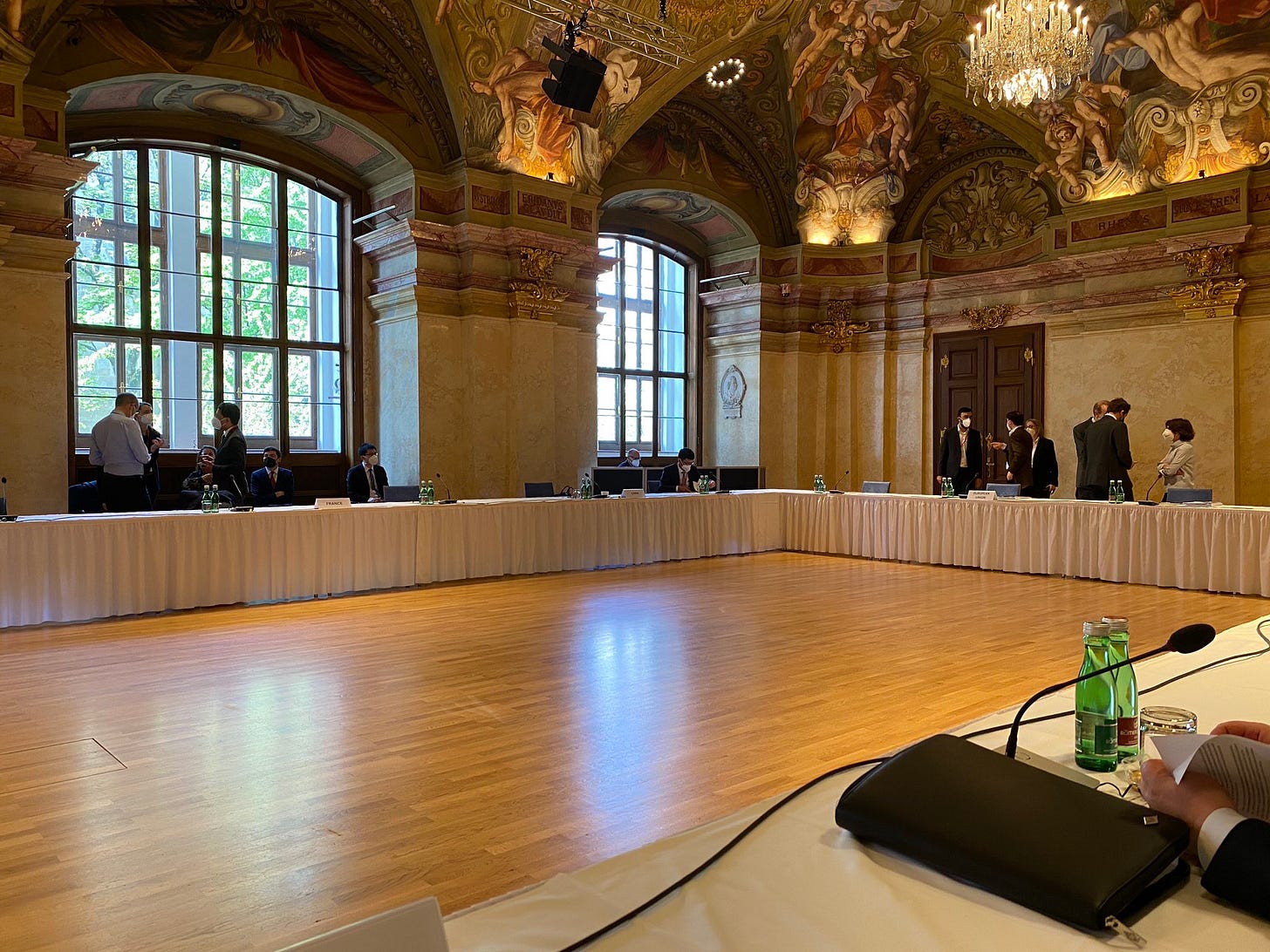‘Unbearably slow’: Scant progress at latest Iran Vienna talks
As negotiators head back to Vienna, Iranian negotiators not seen having maneuvering space to be able to explore solutions, six weeks before Iranian presidential elections.

There was apparently scant progress at the latest international talks in Vienna that wrapped up over the weekend on restoring U.S. and Iranian full compliance with the 2015 Iran nuclear deal, according to diplomats and sources briefed on the talks. Iranian negotiators seemingly had little room for maneuver to explore options as Iran approaches its presidential elections in June.
“Look, they have not been making much progress, honestly,” an Iran expert who consults closely with US and other negotiators told me. “In fact, the Iranians apparently have not responded to any outstanding questions on the nuclear front. And on sanctions, it made very, very little progress.
“So it was unbearably slow,” the expert said.
“I am not going to characterize the substance of the negotiations at this point, because they are in an… unclear place in Vienna,” US National Security Advisor Jake Sullivan told a virtual Aspen Institute meeting on April 30.
“We have seen willingness of all sides, including the Iranians, to talk seriously about sanctions relief, nuclear restrictions, and a pathway back into the JCPOA,” Sullivan continued, referring to the acronym for the formal name of the nuclear pact, the Joint Comprehensive Plan of Action. “But it is still uncertain if this will culminate in a deal in Vienna in the coming weeks.”
The U.S. negotiating team, led by Special Envoy Rob Malley, will be returning to Vienna again this week for the fourth round of what is expected to be a multi-round negotiation, State Department deputy spokesperson Jalina Porter told journalists in a phone briefing today (May 5).
Iranian Supreme Leader Ayatollah Ali Khamenei may not want rapid progress at the Vienna talks to result in a potential boost for moderate candidates ahead of Iranian presidential elections due to be held on June 18, the expert suggested.
The Iranian leadership “may not want quick progress before their elections. But they want incremental process,” the expert said.
“Again, I think their system does not give Iranian negotiators enough maneuvering space to be able to explore solutions,” he said. “And the reason is the timeline: with the Iranian presidential elections six weeks away, it is just not conducive to rapid diplomatic process.”
For US and western parties, however, “In the absence of some marginal progress from one round to the other, it is difficult to keep the process going,” he added.
While Iranian domestic politics may be inhibiting rapid progress before its June presidential elections, there is also some time pressure for international negotiators to try to reach an understanding sooner than later. That is in part due to the expiration on May 21 of a compromise agreement reached between Iran and the UN atomic watch dog agency.
An Iranian parliamentary law, passed under the control of now-dominant Iranian hardliners in December, required Iran to cease voluntary implementation of the Additional Protocol and take some other measures to limit International Atomic Energy Agency (IAEA) access. Iran had previously abided by the most robust IAEA monitoring and verification regime on the planet, but in recent months has been exceeding limits to the 2015 nuclear pact, to protest the lack of sanctions relief since then US President Trump quit the deal in 2018.
“Restoring the Iran deal will increase [IAEA] access,” Kelsey Davenport, director for nonproliferation policy at the Arms Control Association, wrote on Twitter Tuesday (May 4). “The JCPOA contains the most robust monitoring regime ever negotiated. Full implementation of the deal gives inspectors regular access…and allows for access to any site to investigate concerns.”


“The United States also has more power as a JCPOA participant to weigh in if Iran and the IAEA cannot come to terms on access to undeclared sites,” Davenport continued.
“There is no deadline, but participants aim at successful completion of the talks in approximately three weeks,” Russia’s ambassador to the IAEA Mikhail Ulyanov and negotiator at the Vienna Iran talks wrote on Twitter May 1. “Is it realistic? We will see.”
The Iran expert who consults with US negotiators said he was also concerned about limited progress in Iran answering IAEA questions about its past nuclear work.
“I think my bigger concern is that there is also not enough progress on resolving outstanding issues with the IAEA,” he said. “And that could result in a resolution in the next board of governors meeting that could become highly problematic for the Iranians. In addition to the fact that the deal between Iran and IAEA will expire May 21…That puts more pressure on the timeline.”
“I think the onus is on Iran,” the expert continued. “I think they need to come up with answers to some of the questions…and take into account that they have made irreversible progress on [centrifuge] research and development, and come up with more realistic demands in terms of sanctions relief.”
**
(P.S. I often update posts with additional information that seems to come in as soon as I hit send. So it is worth checking the hyper link to the piece if you are in the weeds on this issue.)
